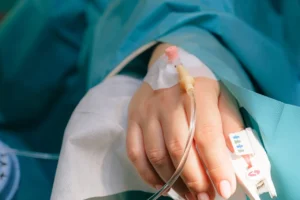Today, ImmunityBio has announced the release of three podcasts in collaboration with UroToday, shedding light on the recent FDA approval of ANKTIVA® (N-803, also known as nogapendekin alfa inbakicept-pmln) alongside Bacillus Calmette-Guérin (BCG) for non-muscle invasive bladder cancer (NMIBC) carcinoma in situ (CIS) and advancements in bladder cancer research. Dr. Patrick Soon-Shiong, the Executive Chairman and Global Chief Scientific Officer at ImmunityBio, delved into the breaking news of ANKTIVA’s FDA approval with Dr. Ashish Kamat, an Endowed Professor of Urologic Oncology and Cancer Research at the University of Texas MD Anderson Cancer Center, during the recent American Urological Association (AUA) Annual Meeting.
In a comprehensive three-part interview with Dr. Kamat, Dr. Soon-Shiong provided an in-depth exploration of ANKTIVA’s distinctive mechanism of action, its implications for cancer immunotherapy, supply updates, and ImmunityBio’s recent partnership with the Serum Institute of India (SII) to ensure BCG supply for patients treated with ANKTIVA. Dr. Soon-Shiong introduced the concept of MHC-negative bladder cancer cells, which are targeted by natural killer cells activated by ANKTIVA, and highlighted ANKTIVA’s ability to restore killer T cells and memory T cells, thereby achieving durable complete responses.
Dr. Soon-Shiong remarked, “The discovery that BCG induces loss of MHC has only recently come to light, resulting in cancer progression due to immune evasion from T cells. These MHC-negative cells are precisely targeted by natural killer cells activated by ANKTIVA. The potential to convert a MHC-negative (cold) tumor to a MHC-positive (hot) tumor by activating NK cells and restoring CD8+ killer T cells and memory T cells may have significant implications in addressing cancers that have progressed to this stage of escape.”
He further stated, “The approval of this treatment signifies a next-generation immunotherapy beyond checkpoint inhibitors, offering a new treatment avenue for patients with BCG-unresponsive NMIBC.”
ANKTIVA, a first-in-class IL-15 receptor agonist, received FDA approval on April 22 for treating patients with BCG-unresponsive NMIBC CIS. Its unique mechanism of action activates the body’s natural killer cells and killer T-cell immune system to combat tumor cells while stimulating memory T cells, resulting in long-lasting complete responses.
The podcasts are accessible for viewing through the following links:
- Addressing BCG Supply Shortages, Workflow, and Enhancing Bladder Cancer Treatment through Strategic Partnerships – Patrick Soon-Shiong
- New Bladder Cancer Treatment: Mechanisms, Clinical Findings, and Implications – Patrick Soon-Shiong
- The Triangle Offense: Harnessing NK Cells, T-Cells, and Memory Cells in Bladder Cancer – Patrick Soon-Shiong
How ANKTIVA (N-803) Works:
The cytokine interleukin-15 (IL-15) plays a crucial role in the immune system by influencing the development, maintenance, and function of key immune cells—NK and CD8+ killer T cells—involved in killing cancer cells.
N-803 is a novel IL-15 superagonist complex comprising an IL-15 mutant (IL-15N72D) fused with an IL-15 receptor alpha, which binds with high affinity to IL-15 receptors on NK, CD4+, and CD8+ T cells. This complex mimics the natural biological properties of dendritic cells and drives the generation of memory killer T cells trained to recognize cancer cells, leading to activation and proliferation of these killing cells and durable complete responses. N-803 exhibits improved pharmacokinetic properties, longer persistence in lymphoid tissues, and enhanced anti-tumor activity compared to native, non-complexed IL-15 in vivo.




